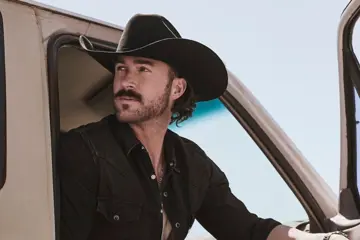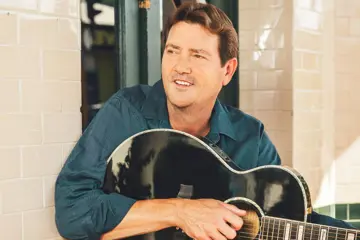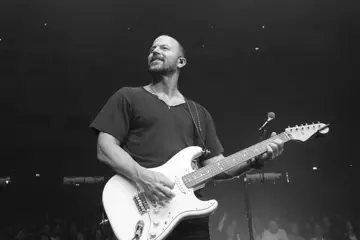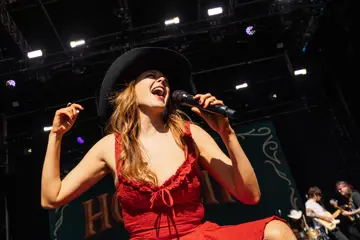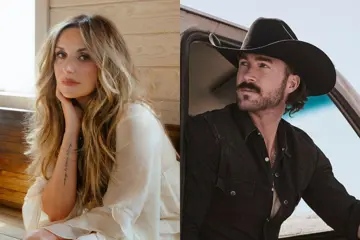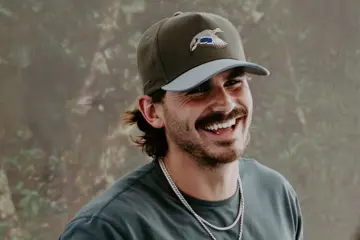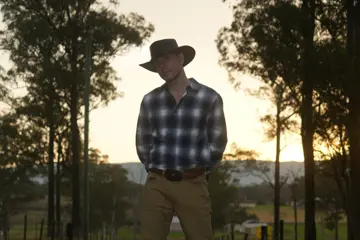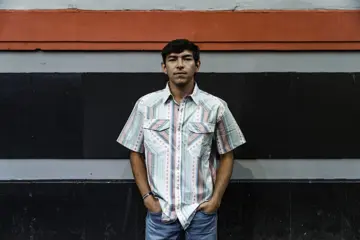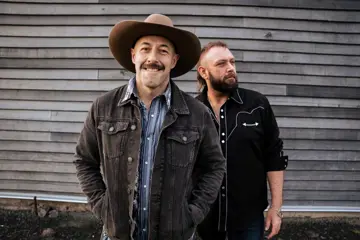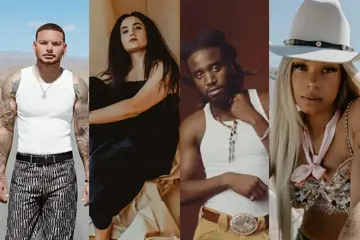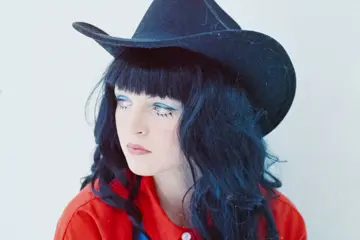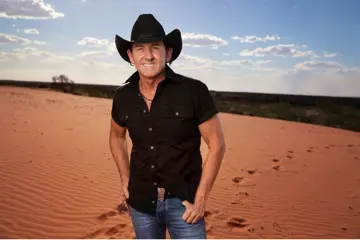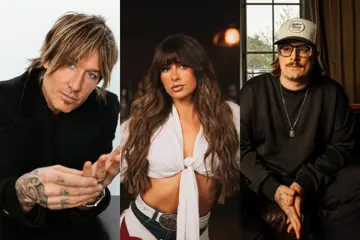Drew McAlister has long been recognised as one of the nation's premier songwriters and performers. As a teenager, he travelled the country with the cast of the Broadway hit Jesus Christ Superstar, alongside John Farnham, Jon Stevens and Kate Ceberano as the principal roles. He later performed as part of Johnny Cash tribute show and with various bands over the years, before a trip to Nashville shifted his focus, steering him towards his home-grown country roots.
His catalogue of single releases alone includes five number one hits on the Country Music Chart as well as an ARIA Award nomination, 4 Golden Guitar Awards and an APRA Song Of The Year Award. He released his debut solo album independently in 2008, and teamed up with Troy Kemp to form powerhouse duo, McAlister Kemp. They released three studio albums (including the 2012 ARIA-nominated album, Country Proud), before disbanding to work on their own respected solo careers.
McAlister went on to release the 2015 album Black Sky and 2017’s Coming Your Way, and was one-fifth of Adam Brand and The Outlaws, the super group who took home the 2017 ARIA award for Highest Selling Australian Artist. McAlister's latest track, When This Is All Over is an upbeat song about the positives coming away from an event or tragedy – apt during these uncertain times – and is the first release since his 2019 singles, The Stranger and Live Young.
At the Tamworth Country Music Festival earlier this year, you reunited with Troy Kemp for the first time since McAlister Kemp disbanded in 2015. Originally announced as a one-off special, you broke a new record for the Longyard Hotel when your late night show sold-out within four days. A second daytime show was later announced for the following day. How did the series of McAlister Kemp reunion gigs come about?
We hadn't been in contact for something like five years – we went off and did our own thing – and then Troy contacted me around the same week a guy named Dan Biddle (President of the CMAA/Manger of the McClymonts) contacted me. He said, “Have you guys considered doing a reunion concert? It’s been about 10 years since you released [McAlister Kemp’s debut album] All Kinds of Tough. One thing led to another and we got back together, wrote a couple of songs, put a band together [and] a setlist, did the gigs and then covid hit, so it was all over before it began [laughs].
McAlister Kemp toured extensively (including opening for Alan Jackson and Big & Rich), performed on some of the biggest festival stages in Australia including the Gympie Muster and CMC Rocks the Hunter, and were nominated for numerous ARIA and Golden Guitar award. Not to mention their three album releases produced #1 video and airplay hits including Country Proud, Hell Yeah, It Don’t Buy You Love, Harder to Tame, Fight Me and All Kinds of Tough. After all that history, did performing together feel like old times or take some time to warm back into?
Join our community with our FREE weekly newsletter
It came back together straightaway. God knows how many gigs we did over the years, but now it's like we've never been apart. I just wish covid hadn’t happened because we had a bunch of gigs and festival booked – they all got cancelled - and plans to release some music. We had a whole bunch of plans. Troy [has since] moved to Nashville [and] I don’t know if he’s going to come back to Australia anytime soon – especially with the international lockdown – [but] he’s been stuck at home in Nashville. I don’t know what the future holds. Maybe house concerts and going live on Facebook is all we’ll have left [laughs].
We’ve written more than ten songs together since covid. We’ve been trying to do it once a week for the last few weeks to catch up and write something. There are some crackers in there that need to be released! But at least we got to do those couple of gigs in Tamworth, and obviously the love is still there [as] we had full houses for both gigs. It was epic!
When I spoke to Troy last year, he mentioned the possibility of releasing a song called After the Breakdown to coincide with your Tamworth appearance. Of the song, Troy said, “After the Breakdown is about getting on with your life after a tragedy or something happening that was bad, but it almost felt like we were writing a cathartic song about us too.” It’s now been almost a year and that song has still yet to be released, is that idea still floating around or been completely changed/cancelled?
We thought about it. That was the first song we wrote in five years. It was based off a friend of ours whose partner committed suicide. That was the start of the idea and then it evolved into a healing process with us. We were gonna release it but then we got together and wrote a whole bunch of other songs. So, I’ll happen. I’m just not sure when we'll release music.
And, who knows, After the Breakdown, it might be that song. We've written a couple of others that are probably better, so we'll see how things pan out. There’s one called When You See Me. It’s awesome! That’s a slower song, but some of the others are more tempo. Troy and I write different songs when we’re solo, but together, we write MK style songs. Something happens when we get together.
It would not be that hard to release a song. We do it in the same studio. Troy does his vocals in the Rukkus Room Studio in Nashville. I do mine here, send it to them and they send it back to me finished. And we've got all the footage we shot for the Tamworth show to compilate into a video clip, so when we finally [decide to] release something, it won't be that hard to do.
I still want to release more music on my own. So does Troy. I've got one more single to put out. Troy's just released his single. We’ve got other interests to scratch – that sounds weird – but something people don’t take into account is that Troy and I were solo for 20 years before we met. We’re first and foremost solo performers. And even though MK had a massive impact, there’s still that solo part of both of us.
Obviously, the duo thing went gangbusters because no one had seen anything like that before in Australia, and we kind of took over the market. And then, when it ended, we handed the Wolfe Brothers the keys [laughs].
McAlister Kemp’s last album Harder To Tame was released in 2014. Can we expect a future MK album?
No, I don't think they'll be an album – it’s just singles from now on. I'm certainly not doing albums anymore and, as far as I know, Troy's not doing albums anymore either. The reason is, if you release an album with 12 songs on it, you probably only get three singles off that album. The rest of the songs, generally speaking, are never heard. By releasing singles, you can focus the attention on the song you're releasing and that way you know that they're going to get heard.
Financially, it's gotta make sense too. Because you don't get paid to release music anymore. The whole Spotify thing slowly killed that. It's a tricky one, because a video and single, that's quite a large investment that you're not going to see a return on now. You would of if you could go out and do gigs, but if there's no gigs, you're not getting any revenue from it. Eventually, once I release a few more singles, I'll probably press off an EP that I could sell at gigs.
Your current solo single When This Is All Over, written during the pandemic, is a feel-good toe-tapping track that focuses on the positives that’ll come at the end of a negative experience or event – such as the pandemic or lockdown, as an example. Obviously, it would have been just as easy to go down a more downbeat spiral during the pandemic. However, is this song a reflection on your attitude over the past nine months?
Yeah, positive but realistic. I can appreciate that, even though there'll be restrictions, [having the break in live music due to the pandemic is] going to give people a bigger appreciation for music. And maybe if they took it for granted before – and that applies to me too – [they] won't anymore, because [they] want to get back to it.
But the reason I ended up releasing that song was because it was tempo. It was positive, happy and upbeat. The last two songs I’ve released – The Stranger and Live Young – were more thinking, more heavily lyric-based songs. So, I definitely was purposely trying to put something out that is fun and giving people hope.
It started with a feel and it evolved from there. It's a light-hearted lyric [and] you're trying to holistically say what you think maybe a greater portion of the population might be thinking. But not everyone is going to be feeling this because a lot of people, their lives have just continued on. But there is a portion of the population who are going to feel that.
I'm also thinking [about how this song is] going to translate further down the track. I think it will, because it's about coming to the end of something in your life, getting through it, and seeing beyond it – could be a drought, a death in the family, it could be anything. I was very aware that, while we were writing it, to make sure that it would have a lifespan beyond this. It's covid related, but it's basically about getting to the end of something and seeing a light at the end of the tunnel.
You’ve been doing many co-writes with other artists during lockdown. Have you found that the pandemic has been a big theme during your co-writing sessions and evident in the lyrics in most of those songs?
No. With the songs I've written lately, there's probably a bit more hope in each song than then there has been before. More of a positive spin on the lyrics, but not necessarily covid based.
I read in an interview where you said when it comes to songwriting, you’re inspired by what you see and hear. Seeing as you’ve been stuck at home indoors for months, where have your song ideas been coming from?
I guess it's about daydreaming – stuff you can observe, looking on social media, seeing what other people are doing, reading stories about people – it can come from anywhere.
I've always got a folder I'm trying to put ideas in, and then if you've got someone like Cole Gentles – who I co-wrote the new single with – he'll send me ideas. We've put together a Spotify folder of songs we like. We might go, "That's a cool tempo or feel. Let's try and write something with that feel, just to try and get the creative juices flowing."
You’re an established and well-respected songwriter, having written hundreds of tunes, both with and for artists including Graeme Connors, Luke O’Shea and Tamara Stewart. You've also worked with U.S. songwriting royalty including Brett Jones (Jason Aldean), Brian Maher (Taylor Swift), and Dylan Altman (Tim McGraw). In terms of songwriting, do you write just to write or go into a writing session with a purpose in mind (ie. needing a song for an album or a specific artist etc)? And did the way you write songs change at all during the pandemic?
Well, no. I think every time you show up to write a song, you just try and write the best song you can.
But one thing I've been doing is rewriting. I started this a couple of years back, because when you sit down to write a song, you’ve got a four- or five-hour window (depending who you’re writing with) and you write the song, you leave it and put it in the folder. But what I realised was there was something in some of those songs that I wrote, which were great, but we just didn't nail it. And then it's a waste of time, because you never come back to the song, and no one ever hears it.
So, I've been rewriting a lot, especially with Cole. Because when you're releasing singles, you've got to be on the money. There are no fillers. It has to hit the mark. You’ve got to be more careful. You’ve got to go, “Are people gonna get it? Are you gonna 100% back it? Have you hit the nail on the head?” And I feel like I have on the last three singles I’ve written. They were poignant. It was the time when I was feeling that. The Stranger was during the fires. Live Young was when my dad was sick and passing away. So, When This Is All Over, it’s got to hit the points where you go, “Is this gonna fit? Why is it going to fit? And why are you releasing it?” Whereas, on an album, you’re probably not thinking about where those songs sit.
You’re not very active on social media, but you went live on Facebook for the first time this year in May and October, respectively, where you shared your front yard landscaping, your daughters said hello and you introduced your new puppy Tank, to your followers. Have you enjoyed the experience of being able to connect with people on a more personal level than they would otherwise normally not get to see?
That’s right, they don’t. Generally speaking, I’m pretty private. But, during this pandemic, it just felt right. I’ve only done two lives, but it was cool. I got to connect with people. I don’t want to do them often because I think they have more impact [that way]. If you’re going live every week, you have to get creative to make them interesting, otherwise it becomes same same. I don’t ever want to be that. I’m not massive on social media, and that’s probably to my detriment. But I don’t want the live thing on Facebook or social media to become the new normal. It’s one thing to do a live thing on Facebook, but it’s never gonna replace being in a room with all those people. You still want those live gigs.
You said in one of those videos that this is the first time in 25 years where you haven’t had to hustle. So not having ever experienced anything like the repercussions that the corona pandemic is having on the music industry before, what were your initial reactions and how have you been spending your time instead?
It was like watching a train wreck. It happened in slow motion. It was the strangest thing to not get out of bed and hustle like I did, trying to book gigs or something. I'm still getting my head around what the future entails. For a while there, I did a lot of stuff around the house, cooking, [my wife and I would] go walking in the mornings with [our daughters], and I got right back into songwriting. I hadn't written songs for a couple of years. I guess I ran out of things to say, but then covid pushed me.
And I realised, I had to get a routine. I had to figure out something, otherwise you’re gonna go nuts! So, I basically started studying some online courses – three so far – one related to music and two unrelated to music. Learning a side hustle, I guess is what you'd call it. It's long and short term investing on the stock market. It's going to take me forever to get my head around it, let me tell ya! I was never very good at school, so for me to have to sit down and concentrate for five or six hours a day studying this stuff [is tough!]
In the end, you’ve got to try and remain happy and make the most of the time. That’s what I’ve tried to do any way – make the most of the time I’ve got off and learn new things.
What’s your take on how the corona virus has affected the future of the music industry?
I'm so uncertain about what's going to happen down the track. Everyone is. I think music will come back, but it won't be the scale that we saw it before. I don’t see band gigs being a priority for anyone for a while. I think solo, duo and trio gigs in capacity will come back, and that will be a way for musicians to make a living, but I just don't see it being on the scale that it was not for a long, long time.
I think house concerts are going to become the new currency, because that is totally manageable. The person putting on a house concert, they're gonna know everyone who's there, where they've been, where they've come from and depending on where you live and how big your backyard is, you can do that.
I've been doing them for a couple of years now. It's a barbecue, essentially. You set up a small PA and you chat with everyone. It's a personal way of doing a gig, whereas you’d probably not get that so much at a band gig. And the costs are completely minimised – that's why I think it’s something people are going to gravitate to down the road.
Apart from the music - which is a given, what’s something you’ve missed during the pandemic?
Well, [obviously] playing live with my band is something I really want to get back to. Country Rocks Festival in Bungendore in March next year, that’ll be the first band gig I will have done in 12 months. But I want to be able to travel more. That's one thing a lot of people are feeling. Just being able to get in the car, go somewhere and not have to worry about where you're going. We did some gigs down south recently [and] it was just nice to drive, just get in the car and go.
I read in an interview that you used to get sick with a rash when you first started performing. Do you have any similar fears about getting back into live music after such a long break?
No, not now. I used to get really, really nervous and I'd get a rash on my neck. I've done it so often now; I’ll just fall back into it. Because I've done all those gigs and played in front of big audiences, I don't get nervous when I walk on stage anymore. I just try to embrace it and have some fun with it. Anything you're afraid of, just keep doing it. That's what I’ve found over the years. The more you do it, the more confident you get with it. That fear just seems to go away.
Keep up to date with Drew McAlister on his website page here.
For more in-depth interviews on CountryTown, check out here.
